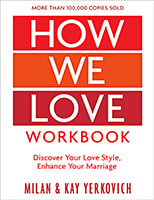Every marriage has nagging problems calling for our attention. Some of us may come to the conclusion that our difficulties are because we married the wrong person. Those who decide to divorce and marry someone else soon find that the same issues keep popping up no matter who they are with. We seem to have the same chronic irritations in our relationship. We find ourselves in the same old arguments that never get resolved. Our marriage relationship just seems stuck.
Sharon and I have realized over the years that much of our conflict and irritation with each other originated long before we even knew each other. It started in our childhood. Our childhood experiences have a huge impact on how we love, receive love, and view relationships. We became aware of Milan & Kay Yerkovich’s book and workbook titled, “How We Love”, which examines this connection between our childhood experiences and how we give and receive love as adults. We knew this was a powerful connection from our own experience, so we decided to read the book and go through the workbook together. We thought it might be beneficial to share some insights from the book as we go through it ourselves, and so for the next few months, our posts will share some excerpts and principles from the book. However, these posts are only a snippet of what’s in the book, so if you want to really dig deeper and get the full benefit, I recommend you buy the book and workbook. I have details and links at the bottom of this post.
Why Every Marriage Gets Stuck
Maybe you find yourself locked in the same tiring dance. Maybe you’ve tried to change things but have been disappointed with the results. Maybe you focused on treating symptoms and surface issues. You can get temporary relief and some limited success that way, but the problem always comes back because there are source patterns underneath that you haven’t addressed. And, until you do, you will be stepping on each other’s feet.
You see, your lessons in love didn’t start when you got married. They started in infancy and lasted all the years you lived with your parents. Our experiences growing up, good and bad, leave a lasting imprint in our souls that determine our beliefs and expectations about how to give love and receive love. Most couples have different childhood experiences leading to different “imprints”, or ways they learned about love. Without even realizing it, you and your spouse may be dancing to a different tune. No wonder you keep stepping on each other’s toes!
Our imprints—healthy or not—form our beliefs and expectations about love. Our imprint determines our love style—how we interact with others when it comes to love. For a few of us, our early love lessons were ideal, and our love style is healthy and positive. Most of us, though, had some hurtful experiences resulting in a harmful imprint and impaired love style. These impaired love styles find their basis in attachment theory. Attachment theory, simply put, is based on a child’s bond with his or her primary caregiver. God designed us to need connection, and our relationships with our parents (or another primary caregiver) are the first place this happens—or doesn’t happen. These early experiences leave a lasting imprint on our souls that is still observable in our adult relationships. To put it another way, what bothers you about your spouse is undoubtedly related to painful experiences from your childhood and a lack of training in addressing the true challenges of marriage. The fact is, we can never truly know our spouses until we understand their childhood experiences.
“Our experiences growing up, good and bad, leave a lasting imprint in our souls that determine our beliefs and expectations about how to give love and receive love.”
Can you recall being comforted as a child after a time of emotional distress?
Your answer to that question could potentially reveal more about your relationships than any other insight you might uncover. Understand that I’m not talking about you falling down and scraping your knee or getting sick with the flu. I’m talking about a time when you experienced significant emotional distress and a parent offered consolation and relief. And the kind of soul-level comfort I’m talking about isn’t just mom bringing you some soup when you’re sick or putting a bandage on your knee. There are three critical components that make up the kind of soul-level comfort I’m describing.
Touch
Significant studies have shown the incredible importance of touch on a baby’s development. If you have a memory of comfort, was your parent hugging or holding you? Was there tenderness, and were you soothed? Some parents touch and hold babies and toddlers but then stop offering nurturing physical contact as their children get older. Yet touch is—and remains—a vital component of true comfort. The fact is, we all need touch—it’s a necessary part of comfort.
Listening
Second, was at least one of your parents able to listen and help you talk about what was upsetting you? Parents who are good listeners ask questions so they can understand what is going on in their children’s hearts and minds. It’s even better when the feelings our kids share are validated as appropriate, reasonable, or understandable. We often offer reassurance and miss the opportunity to really listen. We may tell them, “It will be okay. Everything will be alright” without asking questions to find out more about how they felt or validating their feelings.
Relief
Finally, did you feel relief? If someone noticed we were having a hard time and offered us a safe place to share our troubles, we felt seen and valued. Being touched and listened to brings relief. If we felt sad and our parents listened to what was troubling us and held us as we cried, we were soothed. If a parent assured us that someone bigger and stronger would keep us safe, we were undoubtedly comforted. Comfort is not possible unless an emotional connection is made. When a parent listens to us and asks questions, we have an opportunity to reflect and put words to what’s going on inside us. The self-awareness that comes from learning to reflect gives us the ability to understand our reactions, behaviors, needs, and inner conflicts when we’re adults. This ability is one of the most important skills to bring to a marriage.
“Comfort is not possible unless an emotional connection is made.”
We can’t go back and change our childhood or the pain we experienced, and our parents had the same hurdles from their own childhood, so we are not assessing blame. But by understanding each other’s childhood experiences and how those experiences have made an imprint on how we love others, we can have empathy and grace for our spouse and have a more accurate blueprint to bring about positive, lasting change.
Next month, we will explore the question, “What if I Don’t Have a Memory of Comfort?”
This month’s post is adapted from the book, “How We Love” by Milan & Kay Yerkovich. They also have a companion workbook to help you bring lasting change to your marriage relationship through exercises and questions that did deeper into the principles shared in the book. If you want more than insight and head knowledge, I recommend reading the book and going through the workbook with your spouse. You should get one workbook for each of you since you will be filling it out and have different answers.













Leave A Comment
You must be logged in to post a comment.